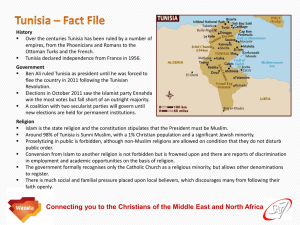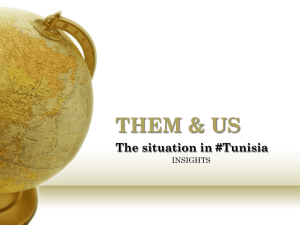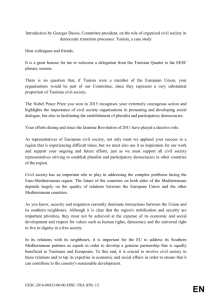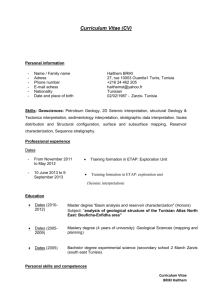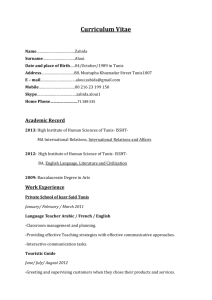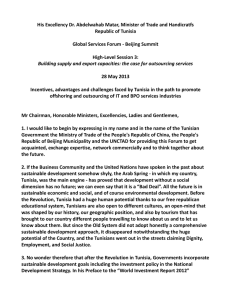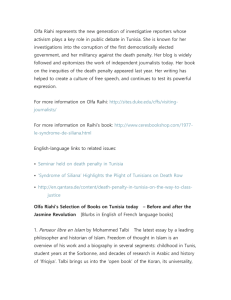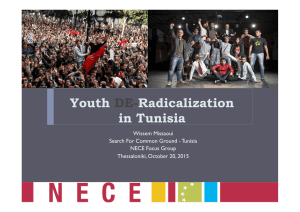Time to Invest In Tunisia
advertisement
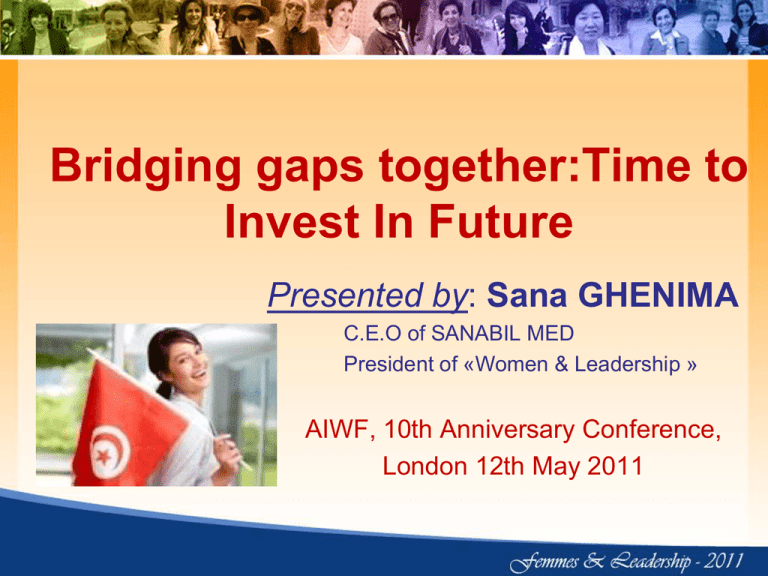
Bridging gaps together:Time to Invest In Future Presented by: Sana GHENIMA C.E.O of SANABIL MED President of «Women & Leadership » AIWF, 10th Anniversary Conference, London 12th May 2011 The Tunisian Revolution: Digital & Soft • REVOLUTION___MADE _IN_TUNISIA\VIDEO_T S\VIDEO_TS.IFO Revolution and beyond • Young Men & Women made this revolution for a better future, for dignity, freedom, democracy and especially EMPLOYMENT. • No coming back on what we built before and especially women rights. Three reasons to invest in Tunisia strategic location in the Mediterranean Tunisian figures: • Population of 10.3 millions • Literacy rate exceeding 80% • GDP/capita of $3,700 • GDP growth averaged over 4% per annum since 2000 • Inflation rate of 3% Tunisia: a small country, a trend-setting nation First Arab country to …. • Abolish slavery in 1848 • Establish a constitution in 1861 • Abolish polygamy in 1956 • Give right to vote to women in 1957 • Legalize abortion in 1973 • Reach literacy rate akin to that of OECD countries in 1992 • Overthrow a dictator through a popular revolution in 2011 Why invest in Tunisia, why now? • Tunisia has travelled the furthest among many developing countries in its journey toward becoming a prosperous democracy - Small, homogeneous and highly educated population - Model for gender equality and tolerance in developing countries - Consistently peaceful, economically prosperous country - Strategically located in the Mediterranean region Why invest in Tunisia, why now? A significant upside today to investing in Tunisia – Promote the development of one of the first true democracy in the Arab world - Support the blossoming of a model for a tolerant Islam as the best way to counter terrorism - Encourage the emergence of a regional economic hub with reach extending to the Arab world, Europe and Africa Massive investment in education has yielded glowing results “If you had to explain America’s economic success with one word; that word would be Education”, Paul Krugman, Nobel Prize in Economics Key facts about education in Tunisia: • 8% of GDP allocated to education • 20% of the population in the educational system (K-12 and university level) • 56% of university students are female • 30% of students follow courses in computer science, engineering sciences and other technical subjects • A country recognized for its innovation: ranked first in Africa (WEF, 2009-2010) Solid institutions and a modern infrastructure Solid Institutions: • Through the revolution, basic services continued to function normally: water, electricity, telephone, internet, etc. • Less than a week after the revolution, government institutions, businesses, the stock market, schools and universities were functioning A modern infrastructure • Several mega projects are underway to complement an already modern infrastructure (deep water port, new industrial zones) • Proximity and connections to Europe, the Middle East and Africa a great asset great place to live, one which will only get better • A country of history and culture • Good quality of life • Open society, host to over 7 million tourists yearly • Proximity to Europe is a great plus A variety of attractive sectors to invest in Mechanical/Electrical: • Presence of the main suppliers to Europe• • Among the 10 main suppliers of cable harnesses to EU countries ICT: • First in Africa as relates to the willingness to enhance and benefit from technology and innovation (Davos 2010-1011 report) Food Industry: • 4th exporter of olive oil and 1st exporter of dates globally • Significant exporter of citrus fruits Textile: • 5th supplier of textile to the EU • 2nd supplier to France after China Leather and footwear: • Tunisia exports 40% of its production to the EU Plastics Industry: • Presence of main international equipment manufacturers industries such as automotive, aerospace, etc Investment opportunities: ICT • Software development: – Industrial engineering – Services related to Human resource Management, Finance and Accountancy • Call Centers: – Telemarketing – Technical support • Data centers: – Content Industry – Digitalisation of documents – Digital culture & Education Investment opportunities: automotive components Electronics: – – – – – MOLEX: Connectors FCI: Connectors FUBA: Printed Circuits ACTIELEC: Electronic Cards JOHNSON CONTROLS: Cockpit Indicators Plastic components: – – – – PLASTIVALOIRE IMTEC NIEF PLASTIQUE MGI COUTIER Wire Harnesses •DRAXLMAIER •LEONI •YAZAKI •LEAR AUTOMOTIVE •KROMBERG & SCHUBERT •YURA CORPORATION •SUMITOMO •COROPLAST Others: •AUTOLIV: Seat Beltsn •ZODIAC: Airbags •FAURECIA: Seat Covers •VALEO: Clutch Systems •BOSCH: Microphones & Loudspeakers Investment opportunities: aerospace • • • • • • • • • AIP TTE International Anjou COFITEL Globe Technologie ZODIAC Aero Stanrew MECAHERS HUTCHINSON • • • • • • • • • SOTIP DURIAL COMMECA SEGNERE EUROCAST SAFRAN SOPRA Midi-Pyrénées SOGECLAIR ALTRAN LATELEC An overall favorable environment for multinationals….. But: Still have more than 600.000 unemployed persons!!! • The Libyan crises added more than 50.000 ! • 150.000 high graduated • 68% of them are WOMEN • We trust in real partnerships shaping better future and preserving the dreams of those young people. • Off shoring traditions are confirmed for leading multinationals • Prosperity is our dream to avoid also illegal immigration .... Challenges!!! Let’s support those emerging economies, emerging leaderships, emerging democracies.... Via their young labour forces!... and No one will be left behind!!! Thank you !!
